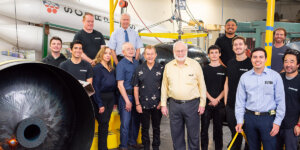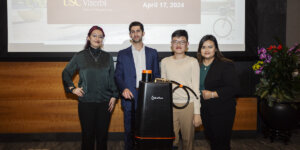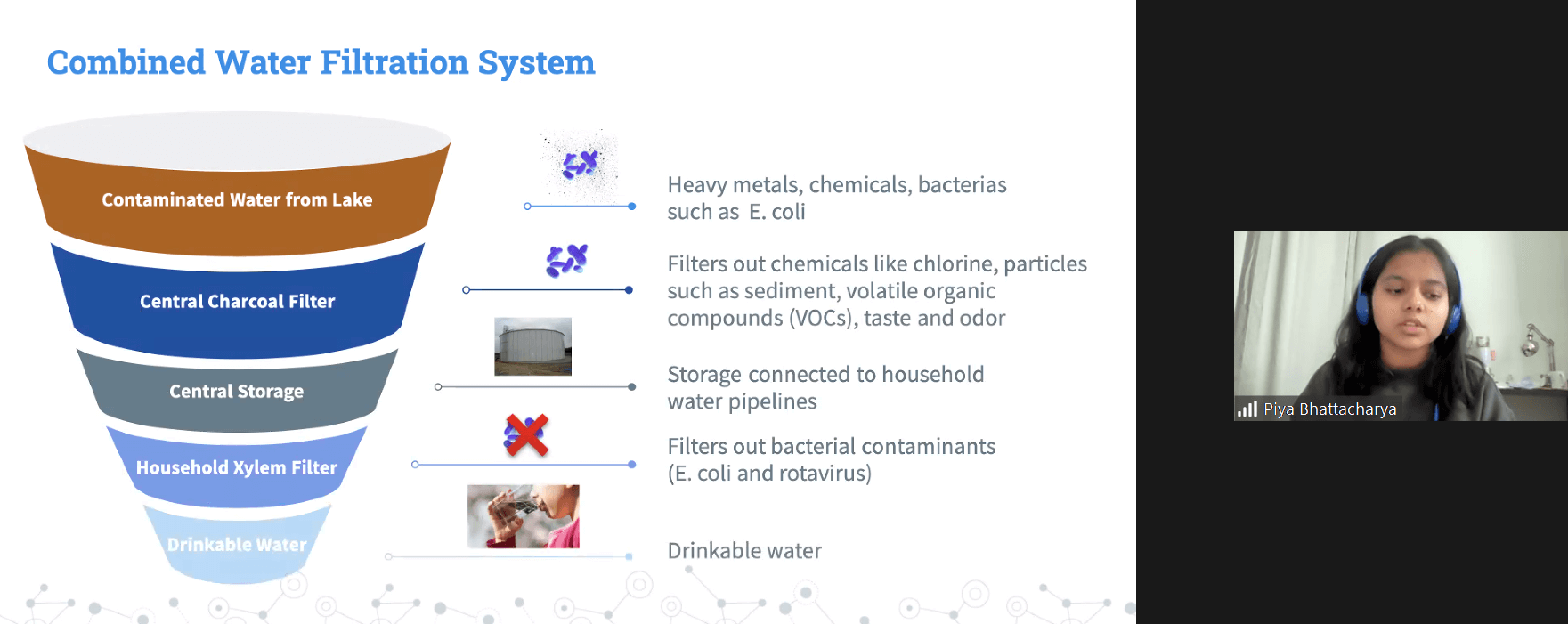
GEDS participant Piya Bhattacharya presents a design for a filter for the North Caribou Lake First Nation community.
Designing a sustainable city is tough.
There’s a lot to do: ensure a community’s safety and security; maintain a high quality of life for all residents; and establish a robust economic and environmental framework for continued settlement. Towns big and small have struggled through these problems for as long as civilization has been around. For Los Angelenos, some of these issues, like traffic congestion and air pollution, have been incessant struggles.
USC Viterbi and a handful of other universities believe the answers to many of these local problems is a global approach, involving gathering the brightest thinkers from across the globe to solve these small-scale problems.
Alongside McMaster University, the University of Auckland, and more, USC Viterbi established the Global Engineering Design Studio, a certificate program that began in February 2022. Participants in the program, who may be enrolled at any of the participating universities, work together in teams to parse through the problems that communities face and come up with solutions.
“We want to produce engineers with a global mindset, who influence the future of design and engineering.”
David Gerber
The program is based on the United Nations Sustainable Development Goals, a set of 17 goals that the UN adopted in 2015, designed to guide the world towards sustainable prosperity. The program focuses on three key areas: “Clean Water & Sanitation,” “Industry, Innovation, & Infrastructure,” and “Life on Land.”
The program meets virtually so that all students can attend lectures together and work on their team-based projects. Each team selectS a city and comprehensively research the problems its citizens face within the scope of the three SDGs. They then brainstorm potential engineered solutions, which could range from innovative new products to wide-ranging infrastructure redesigns.
“Participants extensively collaborate on challenge-based problems with engineering students from around the globe – which actually is the way that a lot of real-world work gets done,” says David Gerber, associate director at the USC Viterbi Office of Technology, Innovation, and Entrepreneurship.
Each of the involved schools contributes a lecturer to the program, who take turns teaching the program’s classes. USC’s lecturer, Denise McKenzie, is a patent litigator who brings her experiences working with technology companies to the course.
“I’m really looking forward to the opportunity to work with students from all over and learn about different cultures, especially with the theme of sustainable cities and communities,” said McKenzie. “I want to see if the viewpoints about entrepreneurship are different in different countries.”
McKenzie hopes the students in the course embrace an entrepreneurial, results-focused perspective as they complete their projects. Part of this mentality involves extensive research into the lives of the community members they are trying to help.
“Steve Jobs would say, ‘Don’t ask the customer what they want.’ But I think that’s too broad,” she said. “You have to ask them the right thing. You’re not asking them for the solution, you’re asking about their problems. Then you can come up with a solution based on understanding the customer’s pain.”
USC Marshall alum Michael Cesar also contributed to the program as a mentor and instructor.
“Brainstorming with people from different environments might help to come up with a more optimal solution.”
Denise McKenzie
The studio concluded in April 2022, when student groups presented to their peers and instructors extensively researched, collaboratively developed concepts that could help their city on its path to reaching the Sustainable Development Goals.
“We are hoping to demonstrate why the problem matters to us and make people realize how important the issue of clean water is,” said Zhenghao Dai, one of the USC Viterbi students participating in the program. Zhenghao’s group researched issues regarding clean water and sanitation in the United Kingdom.
Some of the projects included a water filter that used a lumber byproduct to provide water to the Caribou Lake First Nations, a reverse osmosis filtration system for the Ethiopian Rift Valley, and more community-specific ideas.
One standout project, called Bubble, was ideated by participants Claire Lim, Chaoyang Chen, Aditi Haley, Ruoming Li and Wardah Jabeen. Bubble is a filter that uses microbial bacteria to degrade common types of plastic found in household items like water bottles.
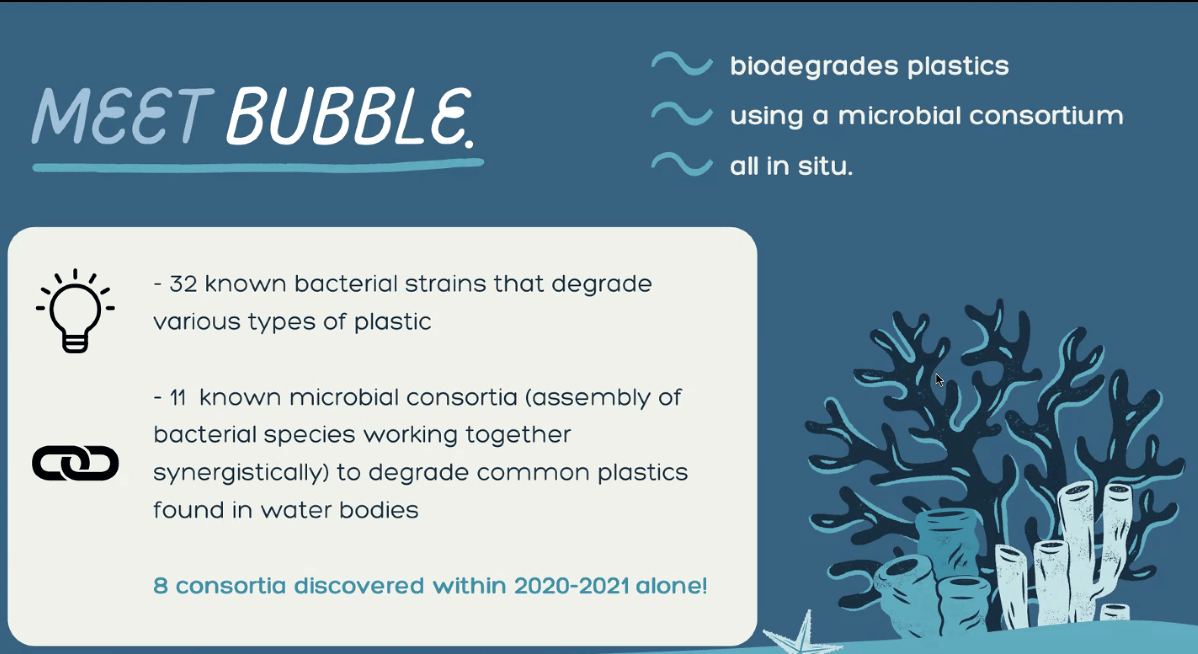
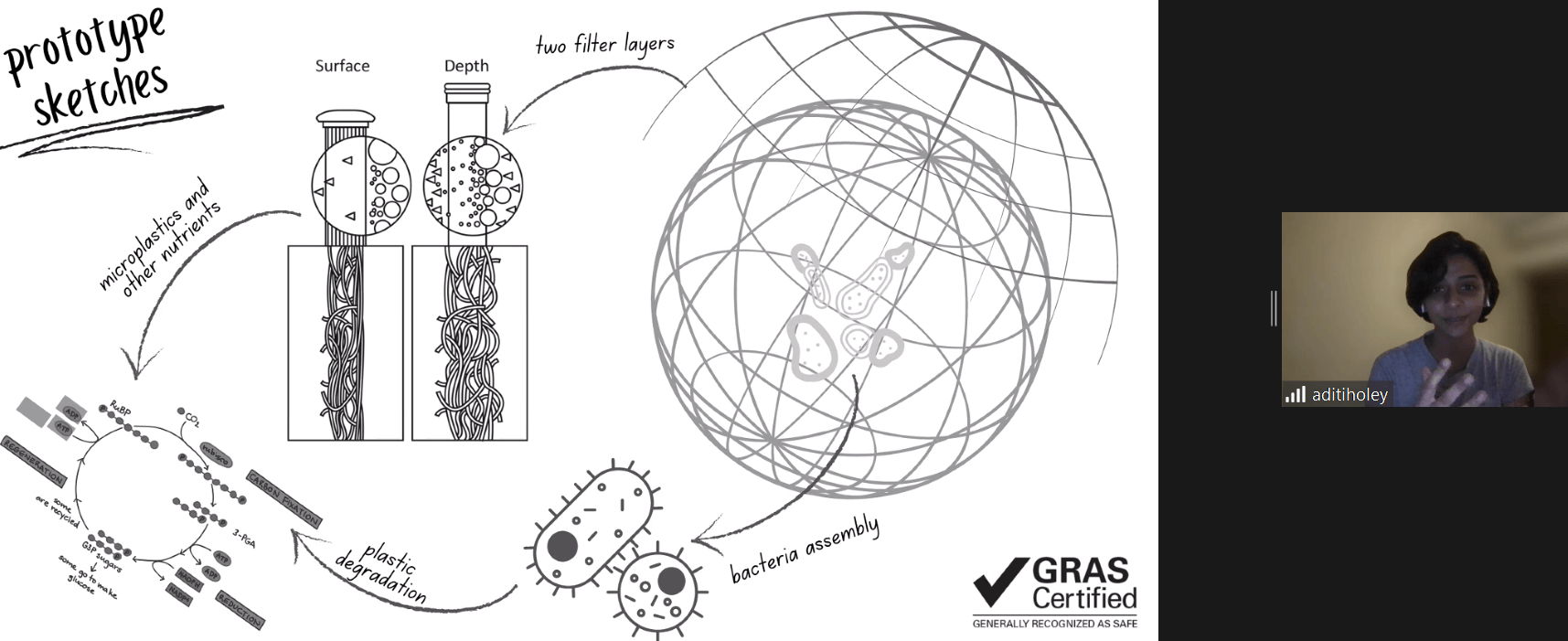
Bubble is a filter designed to remove microplastics from water.
The program coordinators hope that the global mindset of the program produces unique, insightful ideas that could potentially lead to tangible change. If a group develops an innovative proposal for the Los Angeles community, for example, it could easily lead to a future project in collaboration with local government and organizations.
“USC is invested in having an impact on the surrounding community,” said McKenzie. “Many of the subcategories of the SDGs, like navigating traffic congestion and ensuring clean water supply, are important to the underprivileged communities around us.”
Published on April 28th, 2022
Last updated on April 28th, 2022






